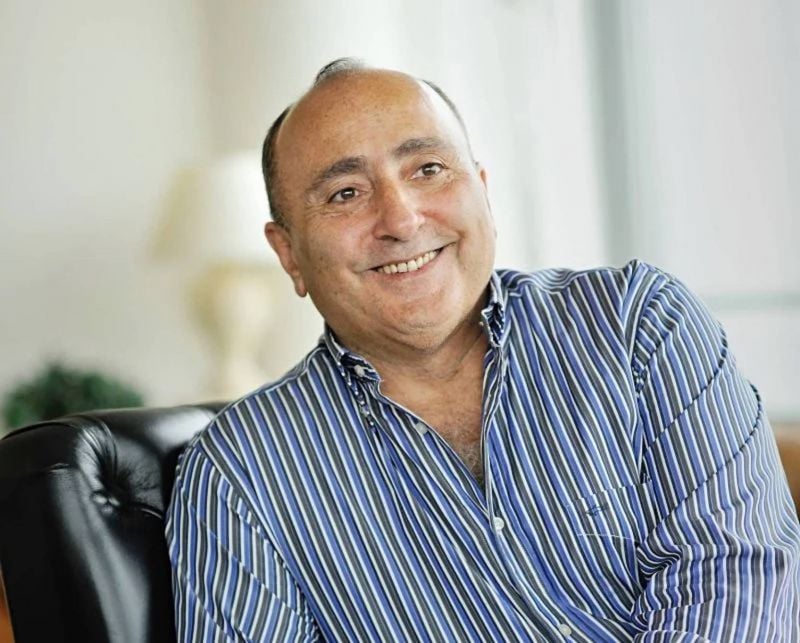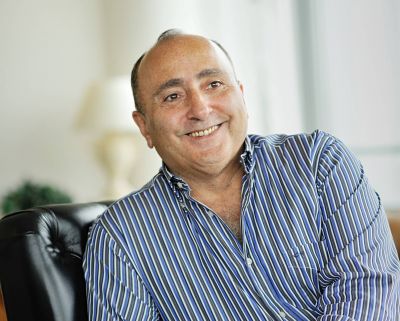
Riad Naboulsi, founder and CEO of the Hungarian company Kőröstej. (Credit: DR)
“Can you imagine that the king of Hungarian cheese is ... Lebanese?” That was the headline atop a story that appeared nearly 20 years ago in the Hungarian press. Today Riad Naboulsi, 67, owns the title with some pride.
From his headquarters in Budapest, Naboulsi runs the Caravans group, founded in 1989. He’s the owner of Kőröstej, the world’s leading producer of kashkaval, a traditional Hungarian cheese, better known as kashkawan in Lebanon. With 55,000 tons of cheese produced per year, of which 30,000 tons are exported from the European Union, Caravans is also Hungary’s leading cheese exporter.
Four factories, 1,165 employees, $170 million in annual revenues and 55 importing countries. These figures suggest something of the reach of the company Naboulsi founded in 1992. Hungary was then turning a new page after the collapse of the Soviet Union. His is a Lebanese success story and an atypical journey that the discreet Tripoli native, who never cut the cord with his birthplace, chose to recount to L’Orient-Le Jour.
A business that runs in the veins
Riad Naboulsi was not a born cheesemaker. Born into a family of eight brothers and sisters, the Lebanese left for Hungary in September, 1975. He was 19 years old and had just completed compulsory military service. The Hungarian government gave him a scholarship to study medicine and he escaped the civl war, that had started in Lebanon six months earlier. For the next ten years, he devoted himself to his studies and then to his practice, specializing in general surgery.
Communist Hungary was a satellite of the USSR. “Salaries, even for doctors, were very low,” Naboulsi recalled. “Mine was barely enough. That’s why I went into business, in parallel with my studies and my surgical practice.”
“Why business? Because it runs in my veins,” he laughed. “As a child, I used to help my father, who worked in the furniture business. That’s how I learned the basics of trade.” Having found an opportunity to sell cookies and chocolates, the surgeon began buying small quantities and selling them outside the Eastern bloc, mainly in Lebanon.
As he began to build his network, he asked his father for a $5,000 loan as seed money to buy his first large shipment. “He flatly refused,” Naboulsi recalled with amusement. “He was afraid I would end up deviating from my medical path.”
Risk-taking
In 1983, a year after completing his first two medical degrees, the 20-year-old Naboulsi decided to take a chance. He went to neighboring Austria, which was outside the Eastern bloc, to sell the Datsun Cherry that his father had given him as a graduation present. The sum he earned — the equivalent of $4,800 — was almost everything Naboulsi needed to start his business.
With this money, the Lebanese expat purchased wafer biscuits for export to Lebanon. He invested some 300 German marks (about $120 at the time) to buy a 20-year-old van in East Germany to replace his Datsun. “It had many problems, especially with the transmission,” he recalled with a laugh. “I had a lot of trouble reversing the gear.”
For the next few years, Naboulsi continued to work as a doctor and merchant. Business was good and a better car finally replaced the van.
It was only with the decline of Soviet influence in Hungary in the late 1980s and the abandonment of the communist regime that the doctor turned to the cheese business. Through his network, and with the wave of privatization accompanying the introduction of the market economy, he became interested in a milk and cheese factory that had been in the red for several years. In 1992, Naboulsi joined forces with five other Hungarians to buy it. The transaction cost them $70,000. Kőröstej was born.
In just one year he managed to turn the company around. After losses estimated at $50,000 per year at the time of the purchase, the factory made a profit of $200,000 the following year. Its workforce grew from 90 to 120 employees and, given this success, Naboulsi decided to take full control of the company. Short of funds, he was forced to resort to a tried and true method of securing the $7,000 he needed to seal the deal. In 1994, he sold the Opel Vectra he had bought to replace his van a few years earlier, and used the money to buy out his partners’ shares in the company.
Naboulsi never looked back. Where there had been one plant, there were now four. The 120 employees became 1,165 and the yearly production of 800 tons gradually swelled to 55,000 tons. He became a member of the Hungarian Chamber of Commerce and the Arab-Hungarian Chamber of Commerce (of which he was also president). He and his family were granted Hungarian citizenship.
Unbreakable bonds with Lebanon
The doctor had become a cheese seller, but Naboulsi never forgot Lebanon. As evidence, he points out that the tree in his company logo is an amalgam of the Lebanese cedar and the Hungarian oak.
The cheese CEO was also keen to point out that the first container exported by Kőröstej in the early 1990s was bound for Lebanon. In fact, Lebanon now receives some 20 percent of the Hungarian group’s total production: “80 percent of this volume is comprised of kashkawan, with the rest consisting of spreads, mozzarella, triangle cheeses, and burger cheese slices, among others,” said the CEO, whose company has consolidated its presence in Lebanon following the launch of its Hajdú brand a few weeks ago.
Doesn’t this volume justify building a factory in Lebanon?
“Obviously, but unfortunately this is not possible today,” said the man who had already considered this option on several occasions, having had serious discussions with certain Lebanese officials in the early 2000s. In vain, until now.
The father of two has been grooming Omar, his eldest, to take over the family company for nearly five years, hoping that, under his leadership, Kőröstej might finally set up a factory in Lebanon. Omar seems to be on track to follow in his dad’s path.
“He holds a doctorate in... linguistics and English language,” Naboulsi laughed.
Like father, like son.
This story was originally published in French in L'Orient-Le Jour, translated by Joelle Khoury.
